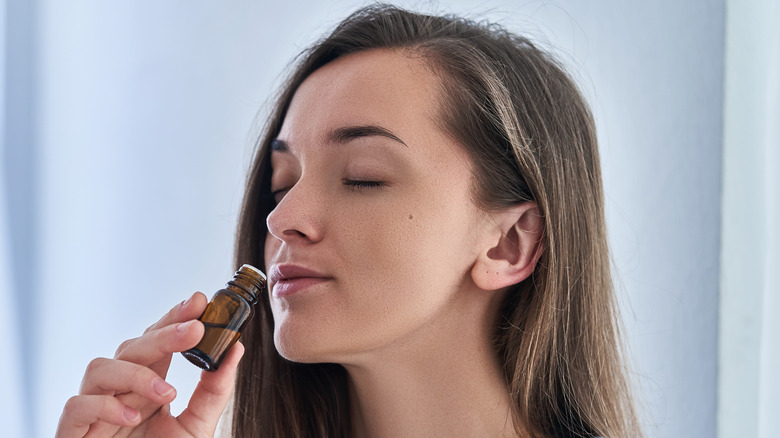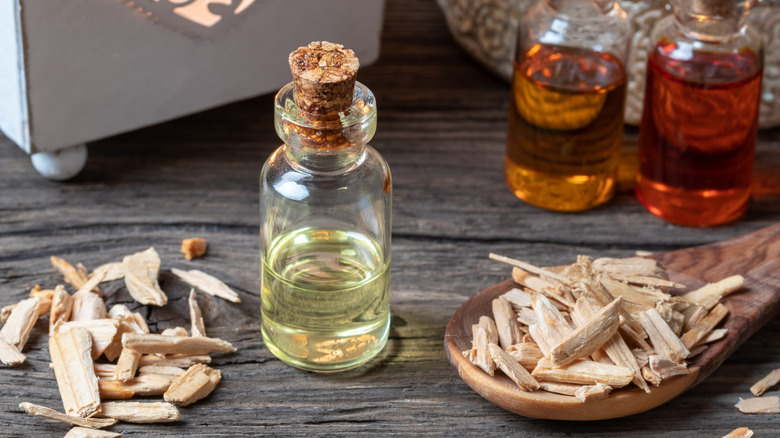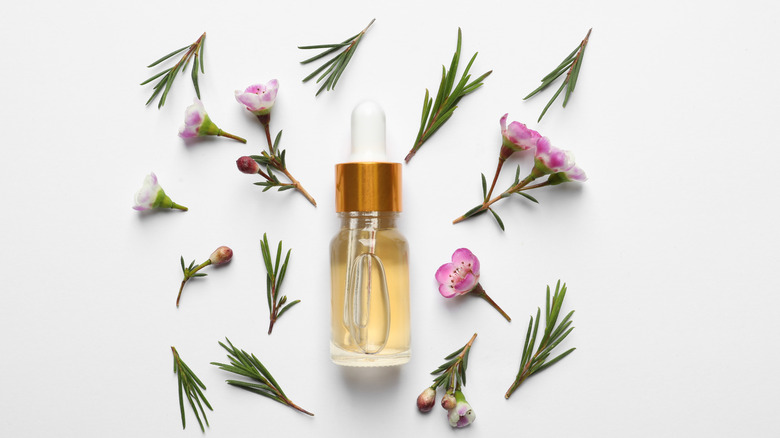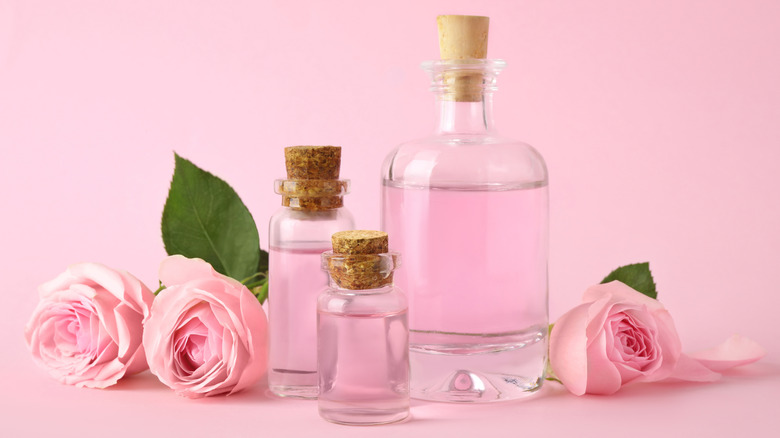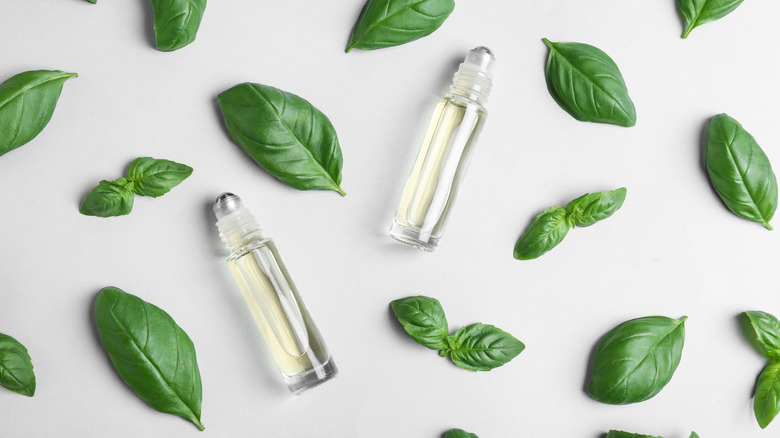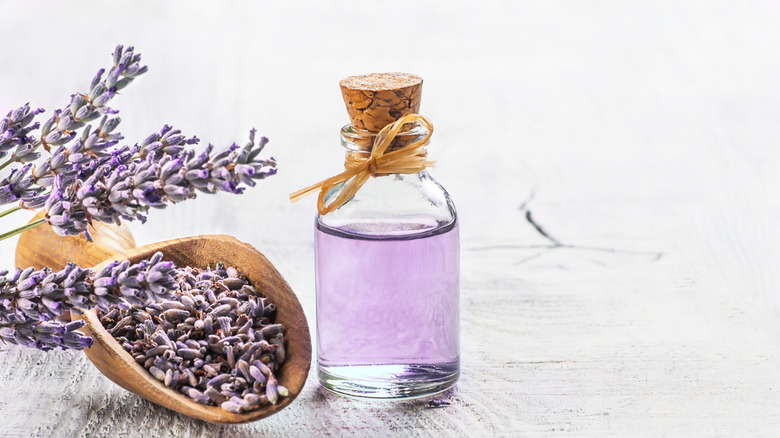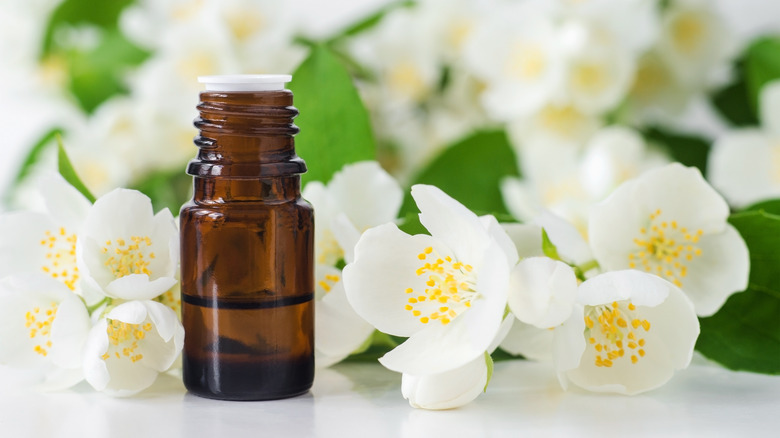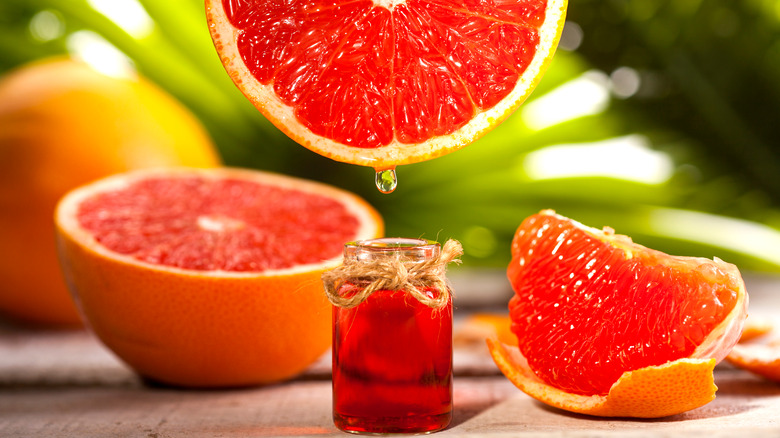7 Essential Oils You Should Be Using And 7 To Avoid
Oils and aromatherapy are sometimes categorized as new-age treatments. However, there's really nothing "new" about them. Records show these plant extracts were being used medicinally as early as 1000 A.D. (via WebMD). But what exactly makes something an essential oil?
As Medical News Today explained, essential oils come from different parts of plants like their roots, leaves, and bark. They are created through a distilling process, and the oils usually have a strong or distinct fragrance. Because of this, they lend themselves well to aromatherapy and can also be applied to the skin. However, as Dr. Joie Power told WebMD, "Essential oils, properly used, are safe and effective for many routine issues, but I continue to hear of bad, even dangerous, reactions from people who are grossly misusing them."
One common mistake? Applying essential oils directly to the skin without first diluting in what's called a carrier oil. Unlike essential oils, carrier oils have little to no scent and come from the nuts, kernels, and seeds of plants (via Medical News Today). They get their name because they help to "carry" essential oils safely onto a person's skin. But even if you properly dilute your essential oils, some still pose potential health risks. Here's a look at some the oils you should be using, and some you should avoid. Note: Always contact your health care professional prior to use.
Cedarwood oil can stimulate hair growth
Hair is kind of a big deal. After all, there's a reason for the phrase "bad hair day" (not to mention barbers, salons, and expensive hair products). So, if your hair is beginning to thin, there's an essential oil that might help save your 'do.
According to WebMD, the properties in cedarwood oil can help stimulate your scalp and kickstart your hair follicles' growth. And there's more good news. If you're dealing with more than one issue with your locks, you can combine cedarwood with other essential oils to create your own personalized haircare formula. For example, clary sage oil can support hair growth. Add to that mix a little lavender oil, and now you're not only encouraging new hair to grow but also keeping dandruff under control and deep conditioning your mane for extra shine.
However, you'll want to avoid using too much cedarwood oil since it can irritate your skin. Mixing a few drops into your shampoo or conditioner or in a carrier oil should be enough to avoid this issue (via WebMD). Jojoba oil is not only a great carrier oil, but it can also help moisturize your hair andstimulate your scalp, making it a good choice to pair with cedarwood oil. One final note: If you have plant allergies, you should first test cedarwood oil on a small patch of skin before using it on your entire scalp.
Cinnamon oil may irritate the skin
From its use in apple pie to french toast, cinnamon is a popular spice that some people find relaxing in its essential oil form (via Healthline). So, it might seem like a safe, natural fix for a fussy baby who is having trouble falling asleep. But not so fast.
The American Association of Naturopathic Physicians has strict guidelines when it comes to infants and essential oils (via Medical News Today). For example, they recommend against using any such oils on babies who are less than 3 months old, and in the case of premature infants, wait at least three months past their due date. But even when a baby is beyond this point, their skin is still sensitive, meaning essential oils like the kind made from cinnamon leaf or bark can cause irritation. In fact, putting a few drops of cinnamon oil in a baby's bathwater can actually cause burns on their skins. Like the old saying goes "oil and water don't mix," so undiluted cinnamon oil will bead up on the water's surface and harm the skin (via Healthline). Adults, too, can be injured this way.
Besides not using cinnamon oil, you should never apply essential oils directly to a baby's skin — nor your own — without first diluting them in a carrier oil (via Medical News Today). Check with your medical care professional before using any products (natural or otherwise) on young children.
Helichrysum oil may decrease the chances of developing scars
You'd be forgiven if you're wracking your brain, trying to remember what flower goes by the name Helichrysum. In fact, the Helichrysum plant genus has more than 600 different species (via Medical News Today). The oil, however, comes Helichrysum italicum or what's commonly referred to as curry plant (via Healthline). Whatever you want to call it, there is evidence suggesting that Helichrysum oil may help prevent scars (via Medical News Today).
According to a review published in the Journal of Ethnopharmacology, laboratory findings indicate curry plant might have antibacterial and anti-inflammatory properties. This means Helichrysum oil might help wounds heal more quickly while preventing them from becoming infected. And the more efficiently a wound heals, the less likely it will be to scar, or at least it will reduce the severity of any scarring. However, a 2013 paper did note one case of allergic contact dermatitis (skin irritation, redness, and swelling) from exposure to Helichrysum oil.
To avoid possible skin issues, Healthline recommends diluting Helichrysum oil in a carrier oil such as sweet almond oil or purchasing it already diluted in a cream. In addition, you should test the oil on a small section of your forearm before applying it to an open wound just in case you have an allergic reaction to it.
When ingested, tea tree oil can be dangerous for children
Tea tree oil can help with a number of ailments, ranging from acne to head lice (via Medical News Today). However, this popular essential oil can be dangerous to have around children. Vanderbilt University Medical Center's Tennessee Poison Center reported an increase in cases of toxic exposure to essential oils, including tea tree oil, between 2011 and 2015 (via WebMD).
"In children, poisoning typically occurs when they try to swallow the oil, but choke so that a little of it goes into the lungs, which causes pneumonia; it only takes less than half a teaspoonful to do that," Dr. Justin Loden explained in a university news release provided to WebMD. Side effects from ingesting tea tree oil can include stomach pain, nausea, vomiting, diarrhea, confusion, tiredness, and hallucinations (via Medical News Today). In severe cases, the individual can slip into a coma.
But what about using tea tree oil topically? Well, Dr. Loden cautioned that errors when applying essential oil to children's skin (like using too much) can also be toxic since their skin is thinner and more likely to absorb higher amounts of the oil (via WebMD). For tea tree oil, this might mean developing allergic contact dermatitis and antibiotic-resistant bacteria (via Medical News Today). There is even limited evidence linking tea tree oil to male prepubertal gynecomastia, or enlarged breast tissue.
Have menstrual cramps? Rose oil might help
If you think of roses as purely romantic, think again. While red roses symbolize love, yellow ones can symbolize friendship (via the American Rose Society). Yes, roses are more than just florals used in Valentine's Day bouquets, and evidence suggests that rose oil may have medicinal properties.
A study published in the Journal of Obstetrics and Gynaecology found women with menstrual cramps experienced less pain after being massaged with rose oil mixed with almond oil. If you're wondering if the carrier oil could be the reason, know that appears not to be the case since a second group in the study had less successful pain control using only almond oil. So why did the rose oil have this kind of effect? Well, the answer may lie in a different study, in which rose oil was used as aromatherapy to reduce the pain children were experiencing while recovering from a recent operation. Researchers speculate that the children's brains may have released endorphins, chemicals that help to relieve pain, in response to the oil.
In addition, research has supported the idea of rose oil reducing anxiety and so helping control pain during labor (via Mayo Clinic). However, if you are pregnant, you should always check with your medical care professional before using any essential oil whether as aromatherapy or a topical treatment.
Roman chamomile and seasonal allergies don't mix
Yes, drinking chamomile tea before bed can help you sleep, but do you know what type of chamomile is in your tea? According to Verywell Health, the flowers of the Chamaemelum nobile (or more commonly called Roman or English chamomile) is found in teas, as well as other products like essential oils. And, unfortunately, if you have seasonal allergies (hello, hay fever), this essential oil might not be a great fit for you.
As Verywell Health explained, Roman chamomile is in the same family of plants as daisies, chrysanthemums, ragweed, and marigolds. So, if you are allergic to ragweed, for example, there is a chance you will react negatively to Roman chamomile. Plus, it is possible to have a skin allergy to this essential oil that can make you itchy and red. If you're experiencing these symptoms, you may want to talk with your health care professional about the possibility of Roman chamomile being the culprit.
Besides seasonal allergies, people with asthma should be careful when using Roman chamomile oil. And here's where things get a little tricky. For some, this type of chamomile is helpful, especially if they are having an asthma attack (via Verywell Health). For others, however, it can actually make their symptoms more severe. Since everyone's body is different, you should consult your health care professional to figure out what's right for you personally.
Need some stress relief? You might want to try basil oil
Whether you grow it yourself or buy it at the supermarket, basil can add that extra touch of flavor to pizza, pasta, and even hummus. But this popular herb is more than a go-to in the kitchen. As an essential oil, two types of basil have been show to reduce stress (via Healthline).
First, let's talk about the type of basil most chefs and aspiring chefs know: sweet basil. Yes, this is the member of the basil family that not only adds zest to pesto sauce but as an oil can help calm down racing thoughts during times of stress (via Healthline). In fact, one study found that chemical compounds in sweet basil reduced anxiety in mice. Now to be fair, this study did say the sweet basil did not sedate the mice as much as the medication diazepam. However, even if any individual takes medicine for anxiety, they might want to ask their health care professional about adding sweet basil to their stress management.
Unlike sweet basil, holy basil has a strong, peppery flavor when used in cooking to the point that it is sometimes called "hot basil" (via WebMD). According to WebMD, holy basil extract can help with stress and address a number of stress-related complications, including memory issues, difficulty sleeping, and sexual problems. However, further research is needed on just how much of an impact holy basil makes on stress and other health issues.
Avoid pennyroyal oil while breastfeeding
Also known as tickweed, pudding grass, and mosquito plant, pennyroyal has been used to treat pneumonia and the common cold (via MedlinePlus). And although it is found in products like soaps, detergents, and bug repellants and is sold as an essential oil, MedlinePlus explained that there are "serious safety concerns" regarding pennyroyal.
According to an article in LiverTox, pennyroyal oil "is highly toxic, and even small doses (one tablespoon, 15 mL) can cause syncope, seizures, coma, cardiopulmonary collapse, acute liver injury, renal insufficiency and multiorgan failure." MedlinePlus categorizes pennyroyal as "likely unsafe" to apply to your skin while breastfeeding or pregnant. In fact, research is finding that the oil made from pennyroyal can cause a woman's uterus to contract, which can cause an abortion. And depending on the amount of oil used, it could also cause irreversible damage to a pregnant person's liver and kidneys or even result in death.
And while LiverTox explained that "pennyroyal oil is not recommended for oral intake," the publication also revealed "there have been many reported cases of pennyroyal oil toxicity." MedlinePlus explains that babies who take pennyroyal can develop major problems with their nervous system and liver, and can die. In one such case, two infants who drank a tea containing pennyroyal oil experienced multiple organ failures, and for one of the babies, the oil was fatal.
Ginger oil can help with knee pain
While most of us think of ginger ale when we have an upset stomach, the plant-based spice isn't just for carbonated soft drinks. Research is finding that essential oil made from ginger may help reduce pain whether you use it topically or as a part of an aromatherapy routine (via WebMD).
In one study, two groups each received a different type of massage for ongoing knee pain: one using ginger oil and one using no ginger oil (via WebMD). After one month, the ginger oil group experienced less knee pain and stiffness than the other group. In addition, the knees massaged with ginger oil functioned better than the knees that were only massaged. Further evidence points to ginger oil helping with joint pain as well. And ginger, like other essential oils, can get it into your bloodstream not only through your skin but also by breathing it in, meaning it can help with pain through aromatherapy as well.
Although ginger oil can be helpful for joint and knee pain, you still do not want to put it directly on your skin without first diluting it in jojoba, coconut, or another carrier oil (via WebMD). And you always want to test essential oils like ginger oil on a small patch of skin just in case you have an allergic reaction like wheezing, coughing, or developing a rash or a headache.
If you have asthma, you might not want to use eucalyptus oil
From candles to creams to soaps, eucalyptus has become a common ingredient in a number of products. And, yes, that includes essential oils. But as physicians Diana Balekian and Aidan Long explained in an article for the American Academy of Allergy Asthma and Immunology (AAAAI), there is a potential problem with using eucalyptus oil if you have asthma.
To be fair, diffused essential oils have not been the subject of a published study. With that said, Drs. Balekian and Long have raised concerns about asthmatics using diffused eucalyptus oil because according to research, it releases volatile organic compounds (VOCs) and specifically a type called terpenes. Now, this isn't totally surprising since eucalyptus oil is made from a plant, and terpenes give many plants their unique scents (via Medical News Today). In fact, terpenes are why some plants are used in products like perfumes. But terpenes are bioactive, which means they can affect the human body.
So, how does this tie back to having asthma? As Drs. Balekian and Long noted, VOCs like terpenes "have been associated with increased asthma symptoms." Because of this they recommend "that patients exercise caution when using essential oil diffusers." In addition to eucalyptus, lavender and tea tree oils release VOCs.
Lavender oil can be good during pregnancy
Before we go any further, let's be clear about one thing. If you are pregnant, you should always speak to your health care professional before using any type of essential oil. With that said, Emily Sisco, who is a certified nurse-midwife with Mayo Clinic Health System, has found lavender oil particularly beneficial for soon-to-be and new mothers (via Mayo Clinic).
As she explained, research supports lavender essential oil reduces anxiety when a woman is experiencing labor. Why? Because scents can trigger memories, and if a woman has a pleasant memory connected to the smell of lavender, then the scent will help her call up those memories. Plus, Sisco said lavender oil can be beneficial for new mothers experiencing postpartum depression not only because it helps with anxiety but also because it may help them get a more restful night's sleep.
Although Sisco recommends lavender oil, she cautions to only use a small amount. "Pregnancy can increase sensitivity to smell, and some women can find aromatherapy overwhelming," she explained. "It may even trigger symptoms, such as nausea." She also advised against swallowing essential oils while pregnant and to never put undiluted oils directly onto the skin.
If you own a dog, you do not want ylang ylang oil in the house
Pronounced e-long e-long, ylang ylang has found its way into shampoos, liquid potpourri, and, of course, essential oil products, the Veterinary Centers of America Inc. (VCA) detailed. But dog owners beware: This blossom is not harmless when it comes to your favorite four-legged friend.
According to the VCA, ylang ylang is one of several essential oils that can be toxic for dogs. And it doesn't take much. As the website states, "Only a couple of licks or a small amount on the skin could be harmful to a dog." Poisoning symptoms can include muscle tremors, difficulty walking and breathing, burns on the tongue, lethargy, and vomiting. Other signs may be more subtle like drooling or pawing at their face. And, of course, if your dog or its vomit smells like ylang ylang, he's probably been exposed to toxic levels of the essential oil.
If you think your dog has been poisoned by ylang ylang or any substance, call the Pet Poison Helpline at 800-213-6680 or a veterinarian as soon as possible (via VCA). The faster you can get your dog help, the better his chance for recovery. Also, do not try to make your dog vomit up an essential oil because doing so could actually make the situation worse. And if your dog has the oil on his skin or fur, wash it off right away with hand dishwashing detergent.
Jasmine oil can alleviate anxiety and depression
Jasmine is more than just another pretty flowering plant (or, for that matter, Aladdin's love interest). In fact, it's an especially potent essential oil when it comes to anxiety, depression, and sleep. How potent? Well, Solara Mental Health states on its website that the smell of jasmine is "as good as valium at calming the nerves without the side effects."
The secret to jasmine oil's success is a neurotransmitter in the brain called Gamma-Aminobutyric Acid or GABA. When a person breathes in jasmine's fragrance, it affects GABA, which calms the nerves and promotes feelings of relaxation. As a result, the person is not only less anxious or depressed, they're also able to sleep better. Case in point, a study found that people who breathed in the scent of jasmine while sleeping experienced a less restless, better quality sleep. (via Solara) Plus, when compared to other fragrances that are also supposed to encourage calmness, research found jasmine was five times more effective than its fellow aromatherapy options.
While Solara Mental Health's website says you can put jasmine oil directly on your skin without first mixing it with a carrier oil, you still may want to test it on a patch of skin first since everyone has different allergies and levels of skin sensitivity. Bonus tip: You can even use a few drops of jasmine oil on a washcloth in place of dryer sheets.
Citrus oils increase the chances of getting a sunburn
Like the fruits they come from, citrus essential oils can be beneficial. Lemon oil, for example, might help boost energy (via Verywell Health). Grapefruit oil may help with jet lag and stress. And researching is exploring Bergamot oil's possible impact on cholesterol levels. Yes, there are quite a few potential positives to using this family of essential oils. But be careful. Citrus oils have one major drawback.
As WebMD explained, a number of the oils made from citrus plants have furocoumarins. These chemical compounds and sunlight are a bad combination for the skin. How bad? Chemical-burns bad. And if you were to venture out into the sunshine after using essential oils made from lemons, grapefruits, and bergamots, you could be increasing your chances of developing a sunburn (via Verywell Health). The more oil you use plus the more sun you get, the more likely you will be to experience skin damage.
If you do use citrus oils, you should wait 24 hours before exposing your skin to the sun again, Verywell Health advised. And if you do experience any kind of reaction because of essential oils, contact your health care professional. Even something minor like a mild sunburn should not be ignored. Remember, a small reaction today can become an unnecessarily big health issue tomorrow; the sooner you address it, the better.
